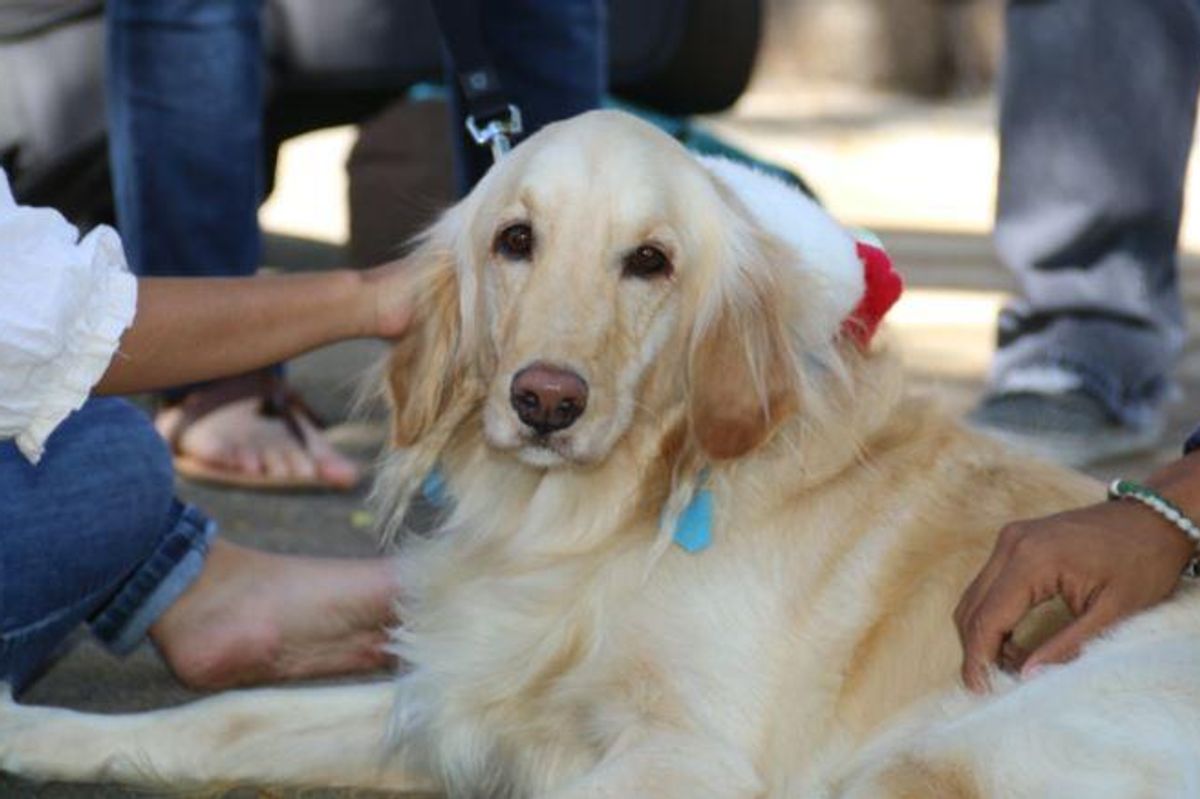Students returning to school in Uvalde are greeted by a team of comfort dogs
Here's how they're helping.

Students relax with a therapy dog.
The first day of school was anxiety-inducing for many children returning to class in Uvalde, Texas, on Tuesday, CNN reported. For some, it was their first time back in a classroom after a gunman killed 19 students and 2 teachers on May 24 at Robb Elementary School.
"I'm so scared and shocked after what happened at my old school, and I'm still scared and nervous,” Zeke Wyndham, whose fourth-grade classroom was down the hall from where the massacre occurred, told CNN. “I can still hear the gunshots,” he said.
To help the students cope with the beginning of the school year, the Uvalde Consolidated Independent School District enlisted the help of the Lutheran Church Charities K-9 Comfort Dog Ministry. It’s a “human-care” ministry that embraces the unique, calming nature and skills of purebred golden retrievers.
The ministry placed 10 dogs at eight schools in the district. The dogs all took different positions at the schools, some greeted students outside, while others waited in counselors' offices for those in need.
"That will keep changing as the needs arise, as the kids get into their routine—and where the dogs are needed, the counselors will instruct us where to go," Bonnie Fear, crisis response coordinator for the Lutheran Church Charities K-9 Comfort Dog Ministry told CNN. "Our goal is to be present with those that are hurting and in need, and we show up and just be with them in whatever they're feeling."
The students' engagement with the animals is meant to be pressure-free so they can express themselves in a way that helps them feel comfortable.
\u201cEight LCC K-9 Comfort Dogs and Hearts of Mercy & Compassion Deploy in Less Than 24 Hours to Mass Shooting at Robb Elementary School in Uvalde, Texas. \nPlease pray for Uvalde, TX and our teams as they travel today.\u00a0\n\nDonate to K-9 Travel Fund: https://t.co/jswtDc1mm0\n\n#uvaldeTX\u201d— LCC K-9 Comfort Dogs (@LCC K-9 Comfort Dogs) 1653492604
"We're trained to be quiet. We don't want to do a lot of talking. We want them to interact with the dog and to feel what the dog can help them through their emotions," Fear said according to KSAT.
This isn’t the first time the charity has been in Uvalde. It provided dogs to comfort students at the schools last May in the days following the shooting. The ministry says that the dogs’ presence helped a lot of students feel comfortable returning to class after the horrible event.
There is a lot of research that shows therapy dogs can reduce stress and provide a sense of connection for people in difficult situations. But it’s important to note they have a different job than service dogs, who help individuals with physical challenges or mental health struggles.
Therapy dogs are trained to respond to people in their environment such as a school or hospital. Research shows that therapy dogs increase attachment responses that trigger oxytocin, the “trust hormone.” Therapy dogs have also been found to reduce the release of cortisol, the hormone associated with stress.
\u201cComfort dogs are greeting Uvalde students for their return to school. Here's how canine visitors can help after tragedy https://t.co/ftF2h4aWeH\u201d— CNN (@CNN) 1662559462
In a school setting, therapy dogs make it easier for children to open up in therapy settings and help to facilitate discussions and build rapport between people. Edutopia says that therapy dogs also encourage students to attend school and help curb tardiness.
This school year is sure to be hard for a lot of kids in Uvalde. It’s wonderful that the school district and the Lutheran Church Charities are doing their best to help these kids learn, develop and feel safe at a time when the wounds of last summer are still fresh.



 In a 4-day model, kids often (but not always) receive less instructional time. Photo by
In a 4-day model, kids often (but not always) receive less instructional time. Photo by 

 Two woman having a heart-to-heart conversation. via
Two woman having a heart-to-heart conversation. via  A man who has dug in his heels. via
A man who has dug in his heels. via 
 A woman looking at her phone on the toilet.via
A woman looking at her phone on the toilet.via  A man looking at his phone on the toilet.via
A man looking at his phone on the toilet.via 